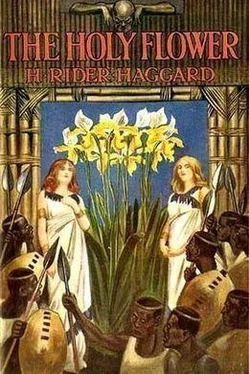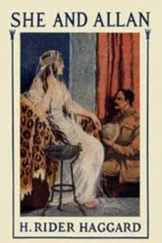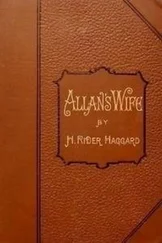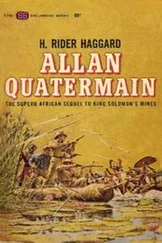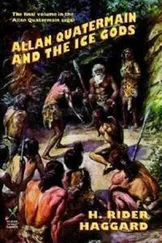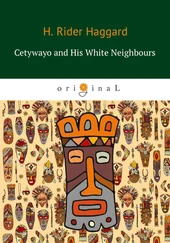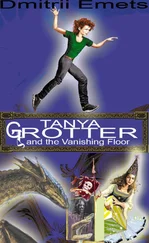Генри Хаггард - Allan and the Holy Flower
Здесь есть возможность читать онлайн «Генри Хаггард - Allan and the Holy Flower» — ознакомительный отрывок электронной книги совершенно бесплатно, а после прочтения отрывка купить полную версию. В некоторых случаях можно слушать аудио, скачать через торрент в формате fb2 и присутствует краткое содержание. Год выпуска: 2014, Издательство: epubBooks Classics, Жанр: Путешествия и география, на английском языке. Описание произведения, (предисловие) а так же отзывы посетителей доступны на портале библиотеки ЛибКат.
- Название:Allan and the Holy Flower
- Автор:
- Издательство:epubBooks Classics
- Жанр:
- Год:2014
- ISBN:нет данных
- Рейтинг книги:5 / 5. Голосов: 1
-
Избранное:Добавить в избранное
- Отзывы:
-
Ваша оценка:
- 100
- 1
- 2
- 3
- 4
- 5
Allan and the Holy Flower: краткое содержание, описание и аннотация
Предлагаем к чтению аннотацию, описание, краткое содержание или предисловие (зависит от того, что написал сам автор книги «Allan and the Holy Flower»). Если вы не нашли необходимую информацию о книге — напишите в комментариях, мы постараемся отыскать её.
Allan and the Holy Flower — читать онлайн ознакомительный отрывок
Ниже представлен текст книги, разбитый по страницам. Система сохранения места последней прочитанной страницы, позволяет с удобством читать онлайн бесплатно книгу «Allan and the Holy Flower», без необходимости каждый раз заново искать на чём Вы остановились. Поставьте закладку, и сможете в любой момент перейти на страницу, на которой закончили чтение.
Интервал:
Закладка:
Someone was firing Beza Town! In less than an hour the flames, driven by the gale through hundreds of huts made dry as tinder by the heat, would reduce Beza to a heap of ashes. It was inevitable, nothing could save the place! For an instant I thought that the Arabs must have done this thing. Then, seeing that new fires continually arose in different places, I understood that no Arabs, but a friend or friends were at work, who had conceived the idea of destroying the Arabs with fire .
My mind flew to Sammy. Without doubt Sammy had stayed behind to carry out this terrible and masterly scheme, of which I am sure none of the Mazitu would have thought, since it involved the absolute destruction of their homes and property. Sammy, at whom we had always mocked, was, after all, a great man, prepared to perish in the flames in order to save his friends!
Babemba rushed up, pointing with a spear to the rising fire. Now my inspiration came.
"Take all your men," I said, "except those who are armed with guns. Divide them, encircle the town, guard the north gate, though I think none can win back through the flames, and if any of the Arabs succeed in breaking through the palisade, kill them."
"It shall be done," shouted Babemba, "but oh! for the town of Beza where I was born! Oh! for the town of Beza!"
"Drat the town of Beza!" I holloaed after him, or rather its native equivalent. "It is of all our lives that I'm thinking."
Three minutes later the Mazitu, divided into two bodies, were running like hares to encircle the town, and though a few were shot as they descended the slope, the most of them gained the shelter of the palisade in safety, and there at intervals halted by sections, for Babemba managed the matter very well.
Now only we white people, with the Zulu hunters under Mavovo, of whom there were twelve in all, and the Mazitu armed with guns, numbering about thirty, were left upon the slope.
For a little while the Arabs did not seem to realise what had happened, but engaged themselves in peppering at the Mazitu, who, I think, they concluded were in full flight. Presently, however, they either heard or saw.
Oh! what a hubbub ensued. All the four hundred of them began to shout at once. Some of them ran to the palisade and began to climb it, but as they reached the top of the fence were pinned by the Mazitu arrows and fell backwards, while a few who got over became entangled in the prickly pears on the further side and were promptly speared. Giving up this attempt, they rushed back along the lane with the intention of escaping at the north–gate. But before ever they reached the head of the market–place the roaring, wind–swept flames, leaping from hut to hut, had barred their path. They could not face that awful furnace.
Now they took another counsel and in a great confused body charged down the market–place to break out at the south gate, and our turn came. How we raked them as they sped across the open, an easy mark! I know that I fired as fast as I could using two rifles, swearing the while at Hans because he was not there to load for me. Stephen was better off in this respect, for, looking round, to my astonishment I saw Hope, who had left her mother on the other side of the hill, in the act of capping his second gun. I should explain that during our stay in Beza Town we had taught her how to use a rifle.
I called to him to send her away, but again she would not go, even after a bullet had pierced her dress.
Still, all our shooting could not stop that rush of men, made desperate by the fear of a fiery death. Leaving many stretched out behind them, the first of the Arabs drew near to the south gate.
"My father," said Mavovo in my ear, "now the real fighting is going to begin. The gate will soon be down. We must be the gate."
I nodded, for if the Arabs once got through, there were enough of them left to wipe us out five times over. Indeed, I do not suppose that up to this time they had actually lost more than forty men. A few words explained the situation to Stephen and Brother John, whom I told to take his daughter to her mother and wait there with them. The Mazitu I ordered to throw down their guns, for if they kept these I was sure they would shoot some of us, and to accompany us, bringing their spears only.
Then we rushed down the slope and took up our position in a little open space in front of the gate, that now was tottering to its fall beneath the blows and draggings of the Arabs. At this time the sight was terrible and magnificent, for the flames had got hold of the two half–circles of huts that embraced the market–place, and, fanned by the blast, were rushing towards us like a thing alive. Above us swept a great pall of smoke in which floated flakes of fire, so thick that it hid the sky, though fortunately the wind did not suffer it to sink and choke us. The sounds also were almost inconceivable, for to the crackling roar of the conflagration as it devoured hut after hut, were added the coarse, yelling voices of the half–bred Arabs, as in mingled rage and terror they tore at the gateway or each other, and the reports of the guns which many of them were still firing, half at hazard.
We formed up before the gate, the Zulus with Stephen and myself in front and the thirty picked Mazitu, commanded by no less a person than Bausi, the king, behind. We had not long to wait, for presently down the thing came and over it and the mound of earth and stones we had built beyond, began to pour a mob of white–robed and turbaned men whose mixed and tumultuous exit somehow reminded me of the pips and pulp being squeezed out of a grenadilla fruit.
I gave the word, and we fired into that packed mass with terrible effect. Really I think that each bullet must have brought down two or three of them. Then, at a command from Mavovo, the Zulus threw down their guns and charged with their broad spears. Stephen, who had got hold of an assegai somehow, went with them, firing a Colt's revolver as he ran, while at their backs came Bausi and his thirty tall Mazitu.
I will confess at once that I did not join in this terrific onslaught. I felt that I had not weight enough for a scrimmage of the sort, also that I should perhaps be better employed using my wits outside and watching for a chance to be of service, like a half–back in a football field, than in getting my brains knocked out in a general row. Or mayhap my heart failed me and I was afraid. I dare say, for I have never pretended to great courage. At any rate, I stopped outside and shot whenever I got the chance, not without effect, filling a humble but perhaps a useful part.
It was really magnificent, that fray. How those Zulus did go in. For quite a long while they held the narrow gateway and the mound against all the howling, thrusting mob, much as the Roman called Horatius and his two friends held the entrance to some bridge or other long ago at Rome against a great force of I forget whom. They shouted their Zulu battle–cry of Laba! Laba! that of their regiment, I suppose, for most of them were men of about the same age, and stabbed and fought and struggled and went down one by one.
Back the rest of them were swept; then, led by Mavovo, Stephen and Bausi, charged again, reinforced with the thirty Mazitu. Now the tongues of flame met almost over them, the growing fence of prickly pear and cacti withered and crackled, and still they fought on beneath that arch of fire.
Back they were driven again by the mere weight of numbers. I saw Mavovo stab a man and go down. He rose and stabbed another, then fell again for he was hard hit.
Two Arabs rushed to kill him. I shot them both with a right and left, for fortunately my rifle was just reloaded. He rose once more and killed a third man. Stephen came to his support and grappling with an Arab, dashed his head against the gate–post so that he fell. Old Bausi, panting like a grampus, plunged in with his remaining Mazitu and the combatants became so confused in the dark gloom of the overhanging smoke that I could scarcely tell one from the other. Yet the maddened Arabs were winning, as they must, for how could our small and ever–lessening company stand against their rush?
Читать дальшеИнтервал:
Закладка:
Похожие книги на «Allan and the Holy Flower»
Представляем Вашему вниманию похожие книги на «Allan and the Holy Flower» списком для выбора. Мы отобрали схожую по названию и смыслу литературу в надежде предоставить читателям больше вариантов отыскать новые, интересные, ещё непрочитанные произведения.
Обсуждение, отзывы о книге «Allan and the Holy Flower» и просто собственные мнения читателей. Оставьте ваши комментарии, напишите, что Вы думаете о произведении, его смысле или главных героях. Укажите что конкретно понравилось, а что нет, и почему Вы так считаете.
